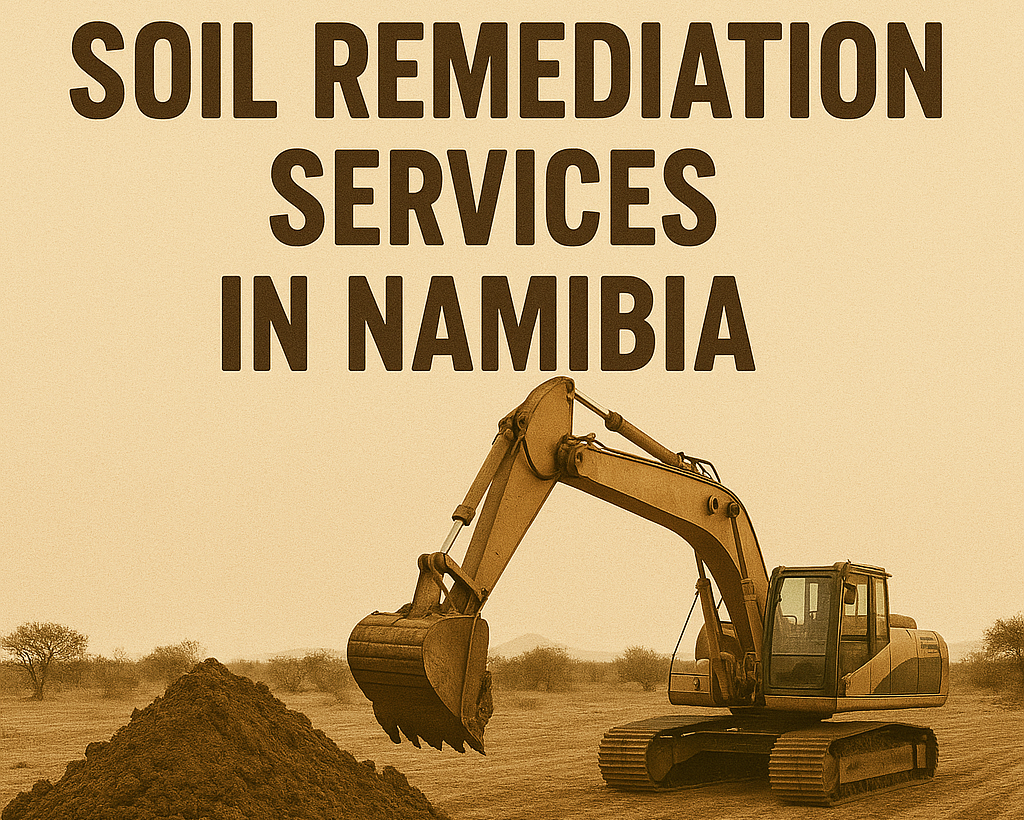Safeguarding Land and Water in a Water-Scarce Nation
Introduction
Namibia, known for its vast deserts, fragile ecosystems, and unique biodiversity, faces one of the toughest environmental challenges: soil and groundwater contamination. With very limited freshwater resources, any form of land or water degradation carries serious consequences. Mining, oil exploration, agriculture, and growing urban centers such as Windhoek, Walvis Bay, and Swakopmund are placing immense stress on soil and aquifers. From chemical runoff in farming regions to heavy metal pollution in mining zones, contamination threatens public health, food security, and long-term development.
At The Ground Water Company, we provide specialized soil remediation services across Namibia. Our mission is to restore degraded land, safeguard scarce aquifers, and support government agencies, industries, and communities in meeting environmental standards while contributing to Namibia’s long-term sustainability goals.
What Is Soil Remediation?
Soil remediation is the process of cleaning up and restoring contaminated soil to make it safe for people, plants, and animals. It’s commonly used at sites where industrial activities, chemical spills, or improper waste disposal have polluted the ground.
In Namibia, the most common soil contaminants include:
- Petroleum hydrocarbons – from fuel depots, transport networks, and industrial activity
- Heavy metals – from uranium, diamond, and copper mining operations
- Chemical residues – from fertilizers, pesticides, and industrial waste disposal
- Salinity and nitrates – from irrigation in arid regions and seawater intrusion along the coast
Soil Contamination Challenges in Namibia
Namibia’s climate and economy create unique contamination risks:
- Mining Legacy – Uranium and diamond mining leave behind heavy metals and tailings that affect soil and groundwater.
- Industrial & Port Activities – Walvis Bay and Lüderitz face risks of hydrocarbon leaks and chemical discharges.
- Urban Growth – Expanding cities like Windhoek struggle with waste management and sewage treatment, stressing soil quality.
- Agricultural Practices – Over-irrigation and fertilizer use in central and northern regions lead to salinity and nitrate buildup.
- Extreme Water Scarcity – With one of the driest climates in Africa, contamination of limited groundwater has long-lasting national impacts.
Our Soil Remediation Services in Namibia
At GWC, we design solutions that respond to Namibia’s desert climate and fragile aquifers:
- Site Assessment & Soil Testing
Soil sampling and analysis to identify contaminants
Risk assessment for human health and environment
Geotechnical surveys to understand soil structure
- Excavation & Disposal
Removal of contaminated soil
Transport to licensed disposal facilities
Landfill management or off-site treatment
3.In-Situ Remediation Services
Bioremediation (using microbes or plants)
Chemical oxidation/reduction
Soil vapor extraction
Phytoremediation
4.Ex-Situ Remediation Services
Soil washing
Thermal desorption
Stabilization
5.Water Treatment
Pump and treat systems
Permeable reactive barriers
Containment systems
6.Monitoring & Reporting
Post-remediation soil testing
Environmental monitoring
Regulatory reporting and documentation.
Why Soil Remediation Matters in Namibia
- Protects Groundwater Security – Safeguards the country’s most critical and limited water source
- Restores Land for Productive Use – Makes degraded land suitable for agriculture, housing, or industrial redevelopment
- Supports National Sustainability Goals – Aligns with Namibia’s environmental protection and climate adaptation strategies
- Ensures Compliance – Meets Namibia’s environmental regulations and international standards
- Safeguards Public Health – Reduces risks from exposure to toxins and improves soil quality in both rural and urban communities
Other Ground water Services We Provide in Namibia
Alongside soil remediation, GWC also offers:
- Ground water exploration
- Ground water recharge
- Ground water contamination
- Dewatering solutions
- Flooding solutions
- Hydrological studies
- Ground water seepage
- Ground water remediation
- Flood risk assessment
Conclusion
Namibia’s arid climate and reliance on groundwater make soil contamination a matter of national urgency. Protecting land and water resources is not simply an environmental responsibility, it is essential for food security, public health, and sustainable economic progress.


